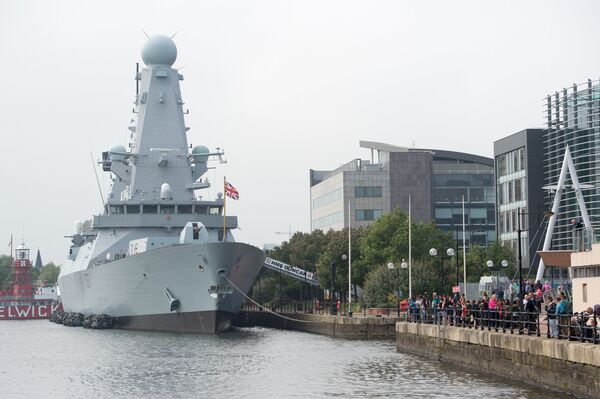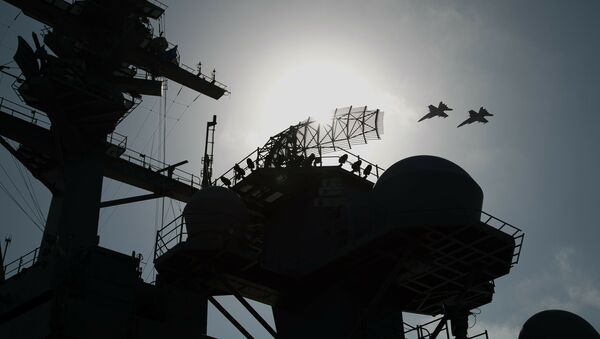A Chinese media outlet has referred to expectations of Beijing joining a US-led naval mission to allegedly safeguard shipping lanes in the Persian Gulf as no more than "wishful thinking".
According to the Global Times report, although some in the US might hope China would become involved in the mission to help alleviate tensions between the US and Iran, such a turn of events is highly unlikely, as it would jeopardise the interests of both Beijing and Tehran.
"This is obviously wishful thinking. Iran is a comprehensive strategic partner of China and China is dedicated to safeguarding peace and stability in the Persian Gulf. Such a coalition would only damage Iran's interests and thus China's", says the report.
It went on to underscore Beijing’s successful cooperation with Iran in fighting piracy, and joint attempts to maintain regional stability and security.
China has dispatched naval fleets on escort missions to the Gulf of Aden, the waters off Somalia and established a support base in Djibouti for ships of the People's Liberation Army, the report goes on to say, adding:
"There should be a maritime coalition, but definitely not one led by the US or one meant to serve US strategies. The coalition should actually safeguard the interests of Persian Gulf countries and their legitimate trading partners".
The Global Times report emphasised that although purportedly conceived to ensure maritime security in the Gulf, the US plan for a naval escort mission through the Strait of Hormuz in reality is part of Washington's long-term strategy "to comprehensively crack down" on Iran.
Few countries have responded to the US “propaganda campaign against the Islamic Republic”, the paper added, slamming "Washington's arrogance and reckless moves" which have caused tensions to spiral in the Persian Gulf in the first place.
US-led Naval Mission
Washington has been trying to build a coalition to patrol the waters of the Persian Gulf in the wake of several incidents involving attacks on oil tankers near the Strait of Hormuz in recent months, all after the US began to beef up its presence in the region.
To date, only a few countries have responded to the US requests to join its naval mission.
The UK currently remains the US’s only ally to sign up for the mission.
On 5 August Britain agreed to join the US tanker escort mission, with UK officials stressing, however, that there had been no change to London’s policy on Iran and that it would not be joining Washington’s sanctions targeting Tehran.

The United States was reported to have asked Germany to help it secure the strait and contain Iran, but Berlin responded by stressing it did not want to be part of Washington’s "maximum pressure" campaign against Tehran.
Foreign Minister Heiko Maas argued there could be no military solution to the US-Iranian standoff in the strait, through which a third of all seaborne oil passes, adding his bet was on diplomacy.
Senior lawmakers in both the SPD and Angela Merkel's CDU also rejected the idea.
Earlier, Iranian Foreign Minister Javad Zarif stated that the White House had failed to build an allied naval coalition against Tehran in the Persian Gulf because countries that are Washington’s “friends are too ashamed of being in a coalition with” the US.
Iranian President Hassan Rouhani also reiterated his rejection of US plans for a maritime coalition in the Persian Gulf, saying that Gulf states are able to protect regional security all by themselves.
“There is no need to attract foreign forces in order to maintain security in the Gulf", Rouhani emphasised.
Tanker Standoff
In early July, British marines and Gibraltar police seized an Iranian tanker off the Southern coast of the Iberian Peninsula, with Gibraltar’s Chief Minister Fabian Picardo claiming the vessel was transporting crude oil to Syria “in violation” of the EU sanctions on Damascus.
Iran condemned the UK's “illegal move”, rejecting claims that the supertanker was carrying crude for Syria, as Supreme Leader of the Islamic Revolution Ayatollah Seyed Ali Khamenei warned London of a pending response to the seizure of the vessel that he said was “tantamount to piracy”.
A week later in mid-July, the Islamic Revolutionary Guards Corps impounded the British tanker ship, “Stena Impero”, as it was passing through the Strait of Hormuz en route to Saudi Arabia “for failing to respect international maritime rules”.
The Iranian supertanker Grace 1 was released from detention by Gibraltar authorities on Thursday, in defiance of a request by Washington to transfer the seized ship to US jurisdiction.
Escalation of US-Iran Tension
US-Iranian tensions flared up last year, after Washington unilaterally scrapped the 2015 nuclear deal officially known as the Joint Comprehensive Plan of Action (JCPOA), and reinstated crippling sanctions against the Islamic Republic.
On 8 May 2019, Iran announced a decision to partially discontinue some of its obligations under the deal.
The United States, in turn, escalated its military presence in the Middle East in what White House National Security Adviser John Bolton called "a clear and unmistakable message to the Iranian regime", sending a carrier strike group, Patriot missiles, B-52 bombers and F-15 fighters to the area.


